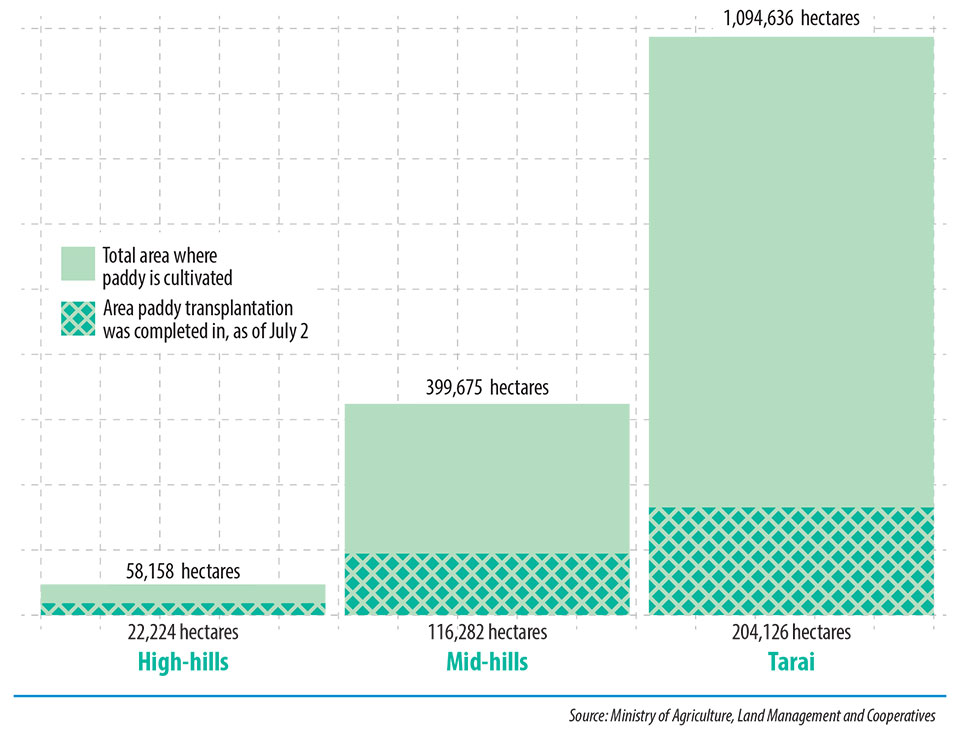In a commendable move, the government has announced a plan to purchase paddy worth about Rs 2 billion from farmers, a decision that not only ensures stability in rice prices but also provides much-needed support to farmers across the country. The Food Management and Trading Company Limited, spearheading this initiative, has allocated a budget of Rs 1.74 billion for the purchase of paddy, demonstrating a commitment to bolstering the agricultural sector. Government officials stated that the company has already initiated the purchasing process. Depots across Bardiya, Rajapur, Dhangadhi, Mahendranagar, and other locations are actively involved in purchasing paddy. With approximately 4600 metric tons of paddy already procured, the company is on track to achieve its goal of purchasing 50,000 metric tons of paddy this season. The decision to purchase paddy directly from farmers is not only a strategic move to stabilize rice prices but also a lifeline for the farmers in need.
Farmers expecting relief as govt sets support value of paddy g...

The Food Management and Trading Company Limited buys paddy at the government-determined support price, ensuring fair compensation for the hard work of farmers. The government has set the price of coarse paddy at Rs 3,198 per quintal and medium paddy at Rs 3,362 per quintal, providing farmers with a reasonable and assured income. Last year's purchase of only 13,494 metric tons of paddy highlighted the need for a more robust approach to support the agricultural sector. This year, the company aims to purchase significantly more paddy, turning it into rice and sending it to 25 districts at risk of food insecurity. The plan includes distributing 175,000 quintals of food grains, showcasing the government's commitment to addressing food shortages in vulnerable areas. Additionally, the Food Management and Trading Company Limited plans to sell and distribute 180,000 quintals of food grains, including rice, at a concessional rate during the fiscal year 2023/24. This initiative aims to make essential food items more affordable for residents in the remote districts where food prices tend to be higher than in the urban areas. The government has allocated a budget of Rs 435.3 million for rice transportation, emphasizing the importance of accessibility to affordable food for all citizens.However, challenges persist, particularly in remote districts of Karnali Province, where the cost of rice transportation remains a significant hurdle. While the government has prioritized these areas for food distribution, the reduction in the budget for transportation compared to the previous fiscal year has led to concerns about potential shortages.
A section of people argue that the government should focus on increasing local agricultural production to reduce dependence on external sources. Some stakeholders express concern that Karnali residents have become overly reliant on rice imports, impacting local agricultural production negatively. The high cost of transporting rice to Karnali, including expensive helicopter transportation, has led to questions about the sustainability of the current approach. Critics argue that a shift towards promoting local agricultural activities could empower communities to become more self-sufficient. As a newspaper, we believe that the government's decision to purchase paddy from farmers is a laudable step towards stabilizing rice prices and supporting farmers in need. While challenges remain, especially in remote areas like Karnali, where dependence on external sources persists, this initiative reflects a commitment to addressing food insecurity and boosting the agricultural sector. The government must continue to refine its strategies, balancing support for farmers with efforts to enhance local agricultural production for a more sustainable and resilient future.







































